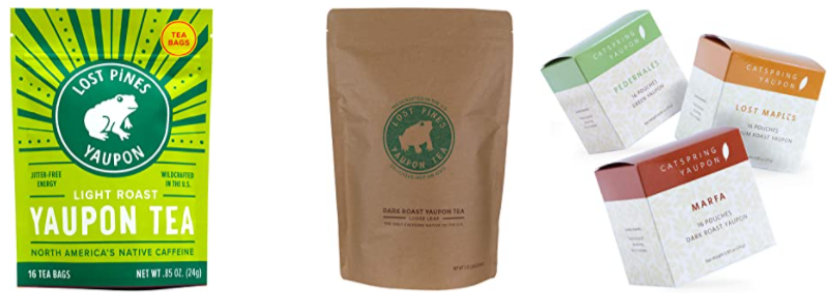by Carolyn Worsham
Yaupon is one of three species of holly found in the Americas known to contain caffeine (the others are yerba mate and guayusa), but it is the only one native to North America – and it’s also native to Southeast Texas! In addition to caffeine, yaupon contains theobromine, a natural stimulant commonly found in chocolate, plus flavonoids and vitamins hailed for their antioxidant and anti-inflammatory properties.
How did yaupon tea get a bad name? American Indians consumed it ceremonially at town council meetings, before hunts and athletic contests, to welcome visitors, and during important annual events. What happened next influenced outsiders’ perceptions of it. Sometimes, after consuming “black drink” in large quantities, American Indians ritually regurgitated as a means of cleansing and purifying the body. The reaction was not caused by the beverage itself, but the ritual left a lasting impression.
Early European settlers developed a taste for the native tea, and in 1695 a London physician even claimed it could cure smallpox. It was promoted as a domestic alternative to purchasing tea from the British East India Company which had been granted a monopoly on the importation and sale of tea in the Colonies; however, after the Revolution the motivation to drink “local tea” subsided. Originally named Ilex cassine by Carl Linnaeus in 1753, it was later discovered to be a different species than dahoon holly and was renamed Ilex vomitoria, possibly as an act of sabotage by King George III’s royal gardener. The US Government also played a part in yaupon tea’s decline when the Indian Removal Act of 1830 forced American Indians out of the Southeast, distancing them from cultural touchstones including yaupon. By 1910, the last commercial yaupon processor had closed.
In 2018 a group of yaupon entrepreneurs formed the American Yaupon Association, dedicated to promoting research, marketing, and commercial advancement. In an environment that values natural ingredients, sustainability, and goods produced close to home, yaupon makes a compelling case. “Instead of tearing down forests on the other side of the world, we can drink a native plant,” said Jason Ellis, co-founder of Lost Pines Yaupon, which is based in Austin and sources wild yaupon from Bastrop.
Can you make yaupon tea at home? Yes!! There are several variations on the Internet, but this method worked well for me. Strip the leaves off a yaupon holly (remember yaupon has alternate leaves; privet has opposite leaves). Wash and dry the leaves and spread them in a single layer on a cookie sheet. Cook at 350° for 15 minutes. Let cool. Crush the leaves between your fingers until fine. Pour boiling water over 2t leaves and steep for about 5 minutes. Oversteeping won’t cause bitterness because no tannin is in the leaves.
Can you buy it in bags or loose? Yes!! Lost Pines Yaupon can be purchased online at Amazon or from https://lostpinesyaupontea.com/. It is also carried at Whole Foods in the Austin area. A source even closer to our area is Cat Springs Yaupon, located northwest of Sealy. Their tea can be purchased online at Amazon or from https://catspringtea.com/.

Can you sample it locally? Yes!! Try the Hummingbird Tea Room, 30420 FM2978 #160, Magnolia, TX 77354; Phone (281) 419-8362; Open Monday-Friday 8:00 AM- 5:00 PM and Saturday: 8:00 AM- 4:00 PM. I haven’t visited there yet, but it’s on my list of places to go.
Sources: American Spirit Magazine (Nov-Dec), “Rediscovering Yaupon Holly Tea” by Courtney Peter and catspringtea.com


